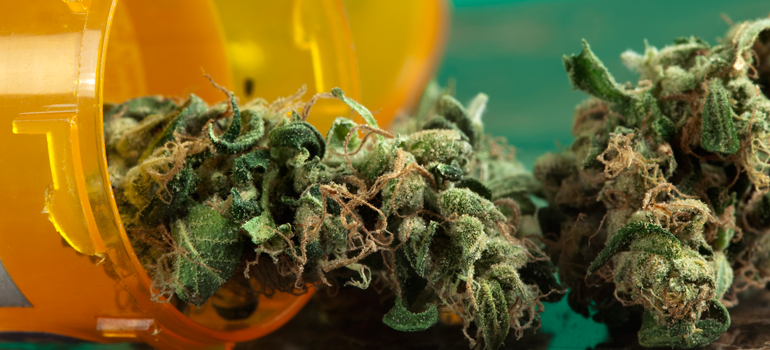
Banks Face Continuing Legal Challenge Servicing Marijuana Growers
Brought to you by Dinsmore & Shohl LLP

 In the past five years, marijuana has become big business in the United States. There are now eight states with fully legalized recreational marijuana. Couple that with the other 20-plus states with legalized medical marijuana and we have two-thirds of Americans living in states with some form of legal access to marijuana. Many of the remaining states have decriminalized possession of small amounts of marijuana. Currently, it is estimated there are approximately 200,000 full-time and part-time workers in the cannabis industry, with legal marijuana and marijuana-related businesses (MRBs) anticipated to account for revenues in the $50 billion range over the next few years.
In the past five years, marijuana has become big business in the United States. There are now eight states with fully legalized recreational marijuana. Couple that with the other 20-plus states with legalized medical marijuana and we have two-thirds of Americans living in states with some form of legal access to marijuana. Many of the remaining states have decriminalized possession of small amounts of marijuana. Currently, it is estimated there are approximately 200,000 full-time and part-time workers in the cannabis industry, with legal marijuana and marijuana-related businesses (MRBs) anticipated to account for revenues in the $50 billion range over the next few years.
However, marijuana remains illegal at the federal level under the Controlled Substances Act. Marijuana continues to be classified as a Schedule I narcotic, which is the highest and most dangerous drug classification. Schedule I drugs are those that have no known medicinal value and the federal government considers to be illegal in all respects. Included with marijuana in this classification are heroin, ecstasy, methaqualone and peyote.
The inconsistency between state and federal laws has caused much confusion and consternation, particularly for financial institutions. In states where marijuana is legal, financial institutions have made many requests for federal guidance on banking MRBs. In 2014, the Department of Justice and Financial Crimes Enforcement Network, or FinCen, responded to such requests with the so-called Cole Memorandum and guidance titled “BSA Expectations Regarding Marijuana-Related Businesses,” respectively. The Cole Memorandum states the federal government will not prosecute within the cannabis industry so long as companies (including banks) obey local and state laws and regulations. The FinCen guidance provided a procedure for filing Suspicious Activity Reports for known MRB bank customers.
Unfortunately, neither of these governs the three prudential federal bank regulators, particularly in the enforcement of Bank Secrecy Act and anti-money laundering rules. As a result, most banks will not touch marijuana-related deposits, make loans to marijuana businesses or permit the use of credit cards on their payment systems. Banks that do provide services to MRBs are very quiet about it. They typically limit the deposits to certain dollar amounts, and if there is any whiff of concern, the accounts are quickly closed. It is estimated that in 2016, about 300 financial institutions in this country knowingly provided deposit accounts to MRBs. Many of these institutions have long standing relationships with their MRB customers and often require them to sign confidentiality agreements to keep the relationship quiet. There has been much speculation on how many banks are unknowingly banking marijuana customers, though it is certain that many are.
All of this legal uncertainty and risk has kept most banks out of the marijuana growing industry, leaving the business almost entirely cash-based. Many MRBs must find workarounds to deal with the cash they cannot deposit and the bills and taxes they must pay. Retailers have methods for hiding cash, including the purchase of armored cars and warehouses where cash can be stored. Many in the business have created their own security forces enlisting motorcycle gangs and former police or military personnel to protect their cash. Employees also are paid in cash, so pay day is staggered in order to prevent robberies. Taxes must be paid in person and are subject to penalties for cash payment. In addition, those who pay their taxes in cash are not eligible to take deductions, so they are paying taxes on gross revenue amounts, though it is difficult to determine (or audit) what those gross amounts really are. Many states are realizing this cash-based business is ripe for organized crime involvement.
With traditional banking mostly out of the picture, many entrepreneurs are working on technical alternative payment platforms as a way around old fashioned banking relationships. Some are using or developing crypto-currency platforms like Bitcoin and, more recently, Potcoin. These are only limited solutions to not having a deposit account or the ability to accept credit card payments. Others are trying to use stored value cards, cell phone apps and other mechanisms. Currently, no alternatives have caught on with the public or the industry. Alternative lenders, including individuals, private equity firms and loan sharks also have stepped in to provide expensive financing to the industry.
The Trump administration does not seem keen on legalizing marijuana, and Attorney General Jeff Sessions appears to be leaning toward increased enforcement. There are numerous bills in Congress to legalize marijuana and permit MRBs to be banked, but it is not clear whether any of these will pass. Until then, most banks will continue facing legal issues and continue avoiding the burgeoning and lucrative marijuana industry.

